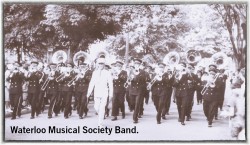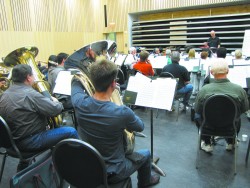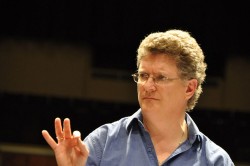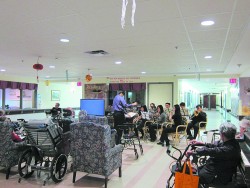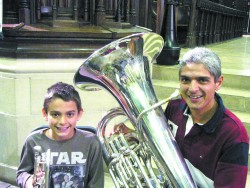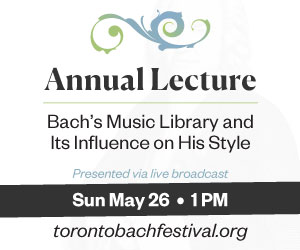Searching for Signs of Life
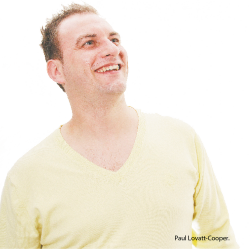 Before tackling the challenge of writing this April column, I would normally look out the window in anticipation of signs of spring and then settle down to report on spring concerts and festivals on the sunny horizon. However, even though my calendar says that spring is now due, mother nature disagrees and has decided to hide any indications that spring might be in the offing. Everything is covered with a white blanket. Unfortunately, several bands that we usually hear from are keeping their spring events hidden under a blanket of silence. In short, there is a dearth of news from the community band world.
Before tackling the challenge of writing this April column, I would normally look out the window in anticipation of signs of spring and then settle down to report on spring concerts and festivals on the sunny horizon. However, even though my calendar says that spring is now due, mother nature disagrees and has decided to hide any indications that spring might be in the offing. Everything is covered with a white blanket. Unfortunately, several bands that we usually hear from are keeping their spring events hidden under a blanket of silence. In short, there is a dearth of news from the community band world.
Let’s have a look at what we have heard to date. For details of locations, times and ticket prices see the listings section. The first event on our band calendar is the Hannaford Street Silver Band’s annual Festival of Brass on the weekend of April 5, 6 and 7 at the Jane Mallett Theatre. The festival begins, as in previous years, with “Rising Stars.” This will feature finalists in HSSB’s annual Young Artists Solo Competition at the Church of the Redeemer on Bloor St. in Toronto. The winners of this competition then have the honour of performing their selected solos with the Hannaford Street Silver Band in the final concert of the festival on Sunday afternoon.
Rumour has it that Jacob Plachta, winner last year and the year before, may well be on the scene again this year. Last year Plachta not only won the competition, but did so performing his own composition Sonata for Trombone and Brass. Although we have no details in time for publication, I have heard that a number of members of the Hannaford Youth Band have now been bitten by the composing bug and have several compositions in the works. Plachta has apparently written a new work this year but we don’t have any details yet.
On Saturday, after masterclasses in the morning, it’s the “Community Showcase” where brass ensembles from the GTA and beyond compete for the annual Hannaford Cup. In past years there have been participating groups from as far away as upstate New York and Ottawa. On Sunday it will be guest conductor Alain Trudel on the podium for the grand finale of the weekend featuring winners of HSSB’s annual Young Artists Solo Competition and Festival Slow Melody contest performing with the HSSB. The show will conclude when the Hannaford Youth Band joins in for a massed band finale.
Of particular interest will be the North American premiere of Breath of Souls by the young British composer Paul Lovatt-Cooper. Having not heard of this composer before, it was time for a little research with the aid of such authorities as Google and associates. Coming from a Salvation Army family, he studied music at the University of Salford. After a stint as a percussionist with the renowned Fairey Band he is now “composer in association” of the Black Dyke Band. In recent years several of his compositions have been recorded by leading brass bands in Europe and the UK. His composition The Dark Side of the Moon was selected as the test piece for the third section of the National Brass Band Championships of Great Britain 2008 regional contests. The same piece was selected as the test piece for the third section of the 2008 Dutch National Brass Band Championships at Groningen. Breath of Souls was selected as the test piece for the Championship Section of the 2011 National Brass Band Championships of Great Britain held at the Royal Albert Hall, London, in October. The following is a quote from a respected British source: “Ever since a young composer called Paul Lovatt-Cooper came to prominence following the world premiere of Earth’s Fury at Symphony Hall in 2004, the banding world has increasingly taken notice of his unique blend of fresh, inventive and downright enjoyable music making.”
On April 14 Wellington Winds, under the baton of Daniel Warren, will present “Jokes and Riddles,” a program of works by Strauss, Elgar, Ives, Rossini, Bach, Rauber and even P.D.Q. Bach. Guests will be the WW Brass Quintet. This will be at Knox Presbyterian Church in Waterloo. The program will be repeated April 21 in Kitchener.
On April 17 at Byron United Church, London’s own Plumbing Factory Brass Band will present “Celebrating Canada — Our Home and Native Land.” The program will open and close with two different marches both titled Bravura — a word which conjures up our national spirit of energy, pride and glory. Conductor Henry Meredith’s own salute to the Queen’s jubilee celebrations is his fanfare version of God Save the Queen, based on a 19th century harmonization with words describing “Our Native Land, Fair Canada.” Handel’s Coronation Anthem Zadok the Priest follows — it was performed 60 years ago at our Queen’s coronation in 1953. Howard Cable’s The Banks of Newfoundland is an arrangement of several folk songs from our oldest, yet newest, province, and the flora and fauna of Canada is depicted by Laurendeau’s Land of the Maple and Grumble’s popular Chanticleer Rag. Canada’s waterways are then portrayed by Clarke’s cornet solo The Maid of the Mist (named for the famous Niagara Falls tour boat) plus a world premiere performance of a composition commissioned by the Plumbing Factory Brass Band. Called On the Thames, the work by PFBB cornetist Kyle Hutchinson reflects the river Thames in London, Ontario, and its namesake in London, England. In April, Canada’s cold winter should be just a memory, so the band will be thinking of warm breezes when it plays Bach’sAir from Suite No. 3, and looking forward to such summer activities as weddings, jazz festivals and circuses. Representing those summertime events are the rarely heard Sousa waltz song, I’ve Made My Plans for the Summer, Mozart’s Marriage of Figaro overture, an arrangement of Dave Brubeck’s multimetric Blue Rondo a la Turk, in memory of the great jazz pianist who passed away last December, and Duble’s circus music, our second Bravura march for the evening.
In its program titled “Fiesta,” the Milton Concert Band will be exploring the many exciting facets of Latin culture brought to life in classical and contemporary music, on April 20 in the Milton Centre for the Arts.
On April 21 at the Richmond Hill Centre for the Performing Arts, it will be “Silk, Spice and the New World” for the Silverthorn Symphonic Winds, with conductor Andrew Chung, as they explore music from the ancient Silk Road route. This program will celebrate the music of Asia, Europe and the Mediterranean. Camille Watts on flute and piccolo will be their guest artist. Richmond Hill Centre for the Performing Arts,
Unlike most of the other community bands we have heard from, the Pickering Community Concert Band’s April 21 spring concert in Ajax will not be a “themed concert.” Conductor Doug Manning has selected quite a spectrum of works from Toronto arranger Eddie Graf’s arrangement of Clarinet a la Mode to the great British classic Mannin Veen. Paul Schwarz will be their guest vocalist. One week later at the Flato Markham Theatre on April 28, Doug Manning will be at the helm of the Markham Concert Band with a themed concert. “The Best of Broadway” will include selections from The Sound of Music, Mamma Mia, Jersey Boys and others.
More on the trend to themed concerts: In a recent issue I made reference to a trend to program what I referred to as themed concerts. Proponents of the concept argue that a theme is a way to attract an audience. Opponents argue that a “slavish” adherence to a theme can place significant restrictions on suitable repertoire. Personally, I have mixed reactions. Some of the best concerts I have heard in recent times have been skillfully crafted on themes. On the other hand, some of the worst have resorted to second rate selections to adhere to the theme. When I discussed the matter with one conductor, he admitted that he had found himself restricted by programming to a theme and then stated: “You end up servicing a concert with an arbitrary motif.” We would like to hear from readers, particularly band members. What are your thoughts?
More on changing technologies: In the past, much of the information we received on band activities arrived by email. It was almost always in the form of a straightforward press release from which it was a simple matter to extract much of the information. Recently, we have seen a significant change. Several of the submissions that we have received lately have been difficult, if not impossible, to deal with. We now frequently receive PDF files of posters. It is not possible to extract information from these. We could print them and then type in what we read, but this can be very time consuming. Even worse is a simple email message suggesting that we visit one or more websites to hunt for information. One recent submission had suggestions to visit no fewer than ten different websites. There was really nothing to indicate what we might find if we did so.
A different perspective: For someone like myself, steeped in the more traditional forms of music, it is interesting to hear the very different roles assigned to different instruments in the more popular genres of the day. In a recent CBC Radio One program reviewing the latest “Music Industry” awards, the reviewer, commenting on the performance of one “contemporary” group, stated: “They even had a trumpet. It was a nice little touch to have a trumpet.” How would that go over in the band world?
Jack MacQuarrie plays several brass instruments and has performed in many community ensembles. He can be contacted at bandstand@thewholenote.com.


